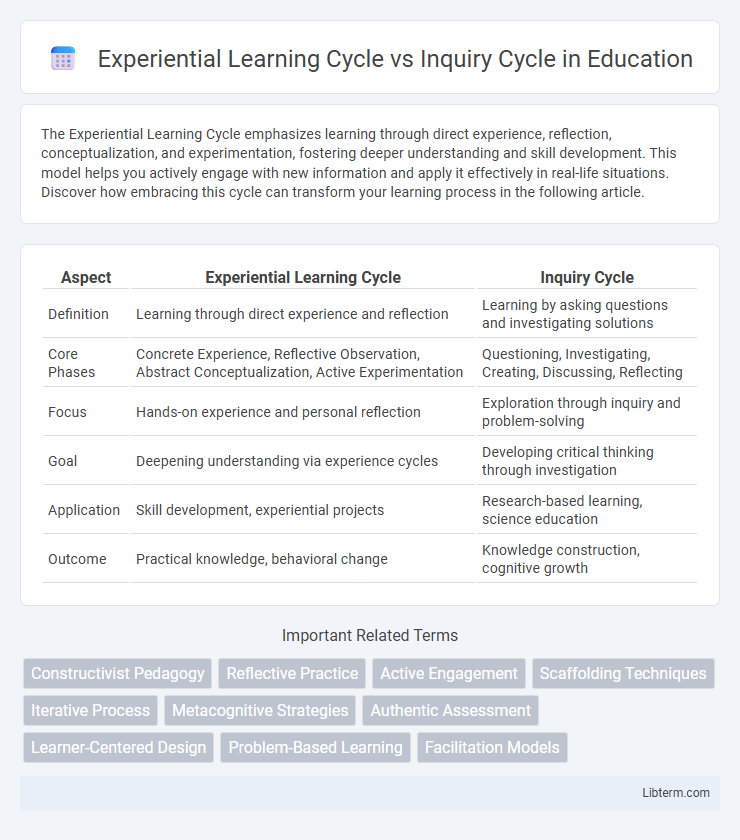The Experiential Learning Cycle emphasizes learning through direct experience, reflection, conceptualization, and experimentation, fostering deeper understanding and skill development. This model helps you actively engage with new information and apply it effectively in real-life situations. Discover how embracing this cycle can transform your learning process in the following article.
Table of Comparison
| Aspect | Experiential Learning Cycle | Inquiry Cycle |
|---|---|---|
| Definition | Learning through direct experience and reflection | Learning by asking questions and investigating solutions |
| Core Phases | Concrete Experience, Reflective Observation, Abstract Conceptualization, Active Experimentation | Questioning, Investigating, Creating, Discussing, Reflecting |
| Focus | Hands-on experience and personal reflection | Exploration through inquiry and problem-solving |
| Goal | Deepening understanding via experience cycles | Developing critical thinking through investigation |
| Application | Skill development, experiential projects | Research-based learning, science education |
| Outcome | Practical knowledge, behavioral change | Knowledge construction, cognitive growth |
Introduction to Experiential Learning and Inquiry Cycles
Experiential Learning Cycle, developed by David Kolb, emphasizes learning through concrete experience, reflective observation, abstract conceptualization, and active experimentation to enhance practical understanding. The Inquiry Cycle centers on questioning, investigating, analyzing, and concluding to foster critical thinking and knowledge construction. Both frameworks support active engagement but differ in approach; Experiential Learning focuses on personal experience integration, while Inquiry Cycle prioritizes systematic exploration and evidence-based reasoning.
Defining Experiential Learning Cycle
The Experiential Learning Cycle, developed by David Kolb, consists of four stages: Concrete Experience, Reflective Observation, Abstract Conceptualization, and Active Experimentation, providing a structured framework for learning through direct experience. This cycle emphasizes the continuous process of gaining knowledge by engaging in an activity, reflecting on it, forming theories, and testing those theories in real-world situations. Unlike the Inquiry Cycle, which centers on questioning and investigation, the Experiential Learning Cycle integrates experience and reflection to deepen understanding and enhance skill development.
Understanding the Inquiry Cycle
The Inquiry Cycle emphasizes a systematic process of questioning, investigating, and reflecting to develop deeper understanding, often starting with curiosity or a problem. This cycle involves phases such as questioning, exploring, analyzing evidence, and drawing conclusions, enabling learners to construct knowledge actively. Understanding the Inquiry Cycle enhances critical thinking skills by encouraging learners to engage in continuous exploration and refinement of ideas.
Key Phases of the Experiential Learning Cycle
The key phases of the Experiential Learning Cycle include Concrete Experience, Reflective Observation, Abstract Conceptualization, and Active Experimentation, which collectively facilitate hands-on learning and knowledge application. These stages encourage learners to engage directly with experiences, reflect on observations critically, develop theoretical insights, and apply new concepts practically. Unlike the Inquiry Cycle, which emphasizes questioning and investigation, the Experiential Learning Cycle prioritizes continuous experiential engagement and iterative learning through doing and reflecting.
Essential Stages of the Inquiry Cycle
The Inquiry Cycle consists of essential stages including questioning, investigating, creating, discussing, and reflecting, which foster deeper understanding through active engagement and critical thinking. These stages emphasize learner-driven exploration and continuous feedback, contrasting with the Experiential Learning Cycle's focus on concrete experience and abstract conceptualization. Inquiry promotes a dynamic process of knowledge construction by encouraging curiosity and iterative refinement of ideas.
Similarities Between Experiential and Inquiry Cycles
Both the Experiential Learning Cycle and the Inquiry Cycle emphasize iterative processes of reflection and active engagement to deepen understanding. Each cycle involves a sequence of stages where learners observe, question, experiment, and analyze to construct knowledge from experience. The core similarity lies in fostering critical thinking and promoting learner-centered exploration through continuous feedback loops.
Distinct Differences in Approach and Application
Experiential Learning Cycle emphasizes learning through direct experience, reflection, and active experimentation, fostering personal insight and skill development in real-world contexts. Inquiry Cycle centers on systematic questioning, investigation, and evidence-based reasoning, promoting critical thinking and knowledge construction through hypothesis and data analysis. Distinctly, Experiential Learning prioritizes hands-on involvement and iterative reflection, while Inquiry Cycle relies on structured inquiry and analytical processes to derive understanding.
Educational Benefits of Each Cycle
The Experiential Learning Cycle enhances student engagement by promoting active participation through concrete experiences, reflection, conceptualization, and experimentation, which fosters deeper understanding and retention of knowledge. The Inquiry Cycle emphasizes critical thinking and problem-solving skills by guiding learners to ask questions, investigate, gather information, and draw conclusions, encouraging independent learning and curiosity. Both cycles improve educational outcomes by developing metacognitive abilities, with the Experiential Learning Cycle focusing on learning from direct experience and the Inquiry Cycle prioritizing investigative processes.
Choosing the Right Cycle for Your Learning Objectives
Choosing the right learning cycle depends on your specific educational goals: the Experiential Learning Cycle emphasizes concrete experiences followed by reflection to deepen understanding, ideal for skill acquisition and practical application. The Inquiry Cycle focuses on posing questions, investigating, and constructing new knowledge, making it suited for developing critical thinking and problem-solving abilities. Aligning your learning objectives with the cycle's strengths ensures effective knowledge retention and meaningful learner engagement.
Integrating Both Cycles for Enhanced Learning Outcomes
Integrating the Experiential Learning Cycle and Inquiry Cycle enhances learning outcomes by combining hands-on experience with critical questioning and exploration, fostering deeper understanding and retention. This integration allows learners to actively engage in concrete experiences, reflect analytically, formulate questions, and investigate solutions in a continuous, iterative process. Educators leverage this dual-cycle approach to promote critical thinking, problem-solving skills, and adaptive learning in diverse educational contexts.
Experiential Learning Cycle Infographic

 libterm.com
libterm.com